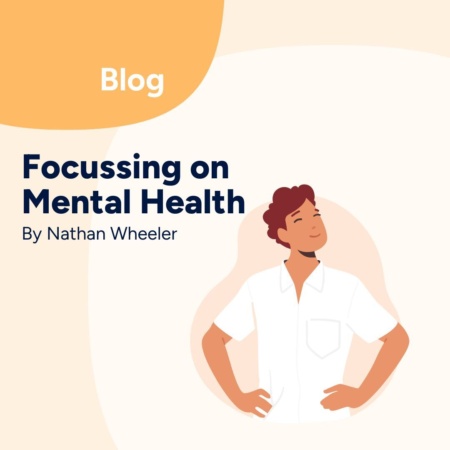Focussing on Mental Health

Hello everyone! It’s time for another blog post!
This time it’s a focus on mental health. Something I am very open about across my social media platforms.
Living with an ileostomy for the past 17 years has been a journey filled with physical and emotional challenges. While the focus often lies on the physical implications of IBD (Inflammatory Bowel Disease) and surgery, the mental health aspect deserves just as much attention. From the moment I found myself two hours from death due to my condition, the mental toll became an undeniable part of my experience.
I was an anxious child long before the surgery, struggling with feelings of unease and insecurity. However, the life-altering event of undergoing ileostomy surgery intensified my mental health battles. The trauma of being so close to losing my life coupled with the drastic changes in my body and lifestyle created a whirlwind of emotions that I wasn’t prepared for. And unfortunately, mental health isn’t something people discuss enough in the context of chronic illness and surgeries like this.
People often assume that once the surgery is done, the hardest part is over. But for many of us, the emotional impact can last much longer. The trauma of nearly dying and the adjustment to living with an ileostomy triggered a huge amount of anxiety that took years to understand and manage (I use the term understand loosely as sometimes, I still don’t understand it!).
One of the biggest things I’ve had to confront is body dysmorphia. Having an ileostomy means my body doesn’t look like it used to, and for a long time, I struggled to accept that. My relationship with my body was already fragile (being that fat kid at school that tried everything to shift the weight, being never “as good” as the other kids), but surgery introduced a new layer of complexity. The bag attached to my body was a constant reminder of how different I was, and it was hard not to fixate on it. I would catch myself obsessing over my appearance, feeling disconnected from my reflection.
It took me a few years to seek help for my mental health. There’s a lot of stigma around medications, and admitting you need help is hard when you’re already dealing with so much physically. But finding the right support, in my case, taking Citalopram (a medication uses to treat anxiety and depression), has been a crucial step in my journey.
I’m open about taking Citalopram because I believe in destigmatising mental health treatments. Just like when you need medication for feeling sick – mental health treatments are the same. This medication doesn’t magically solve everything, but it’s helped me feel more like myself. Instead of hating life or feeling weighed down by anxiety every day, I can function, live, and breathe without the constant shadow of overthinking. It’s not perfect, and I still have tough days, but it allows me to feel like a "normal" human being again.
Even with medication, I still struggle with my mental health. Overthinking is one of my biggest hurdles. I catch myself overthinking about things I said weeks ago, or text messages I’ve sent that could have been worded different. The fear of things going wrong or not being "good enough" often clouds my thoughts. It's not something that disappears with time—it’s something I must manage daily.
I’m still learning to develop strategies to cope with this mental tug-of-war. Checking myself when I start spiralling into negative thoughts has become a daily habit. Self-awareness is key. I’ve had to recognise my mental patterns and remind myself that not every thought needs to be dissected. Sometimes it’s okay to just be. This is something I have to stress to myself daily!
One of the most powerful tools in my mental health toolkit is movement. Meditation and working out (Yoga, High-intensity Interval Training, Strength Training, Cycling) have been essential in keeping my mind quiet and my body grounded. When my thoughts start racing, physical activity is a way to channel that energy. CliniMed offer free downloadable guides to help people with stomas get moving.
Meditation has taught me the importance of stillness. Taking time each day to sit in silence, focus on my breathing, and centre my mind has had a profound impact on my mental state. Allowing my thoughts to flow, and then pass through is such a great place to be. It doesn’t erase my anxiety, but it helps me manage it, allowing me to return to a place of calm when my mind feels overwhelmed.
Yoga, too, has been a healing practice. The stretching and mindful movement help me reconnect with my body in a positive way. It allows me to see my body as more than just the site of a medical procedure or a source of anxiety – it’s strong, resilient, and capable and I am so bloody proud of how far my body has come!
There’s something incredibly powerful about pushing your body physically, especially when you’ve felt betrayed by it in the past. Exercise gives me a sense of control, an outlet for frustration, and a way to clear my mind. After a good workout, the mental clutter often feels less overwhelming, and I’m able to approach my day with a clearer head. I love to work out in the morning, firstly so I can get it out the way, but mostly because it sets me up for the day!
Managing mental health with an ileostomy is a journey that doesn’t have a clear destination. It’s about finding balance, being patient with yourself, and accepting that some days will be harder than others. It’s also about realising that seeking help, whether through therapy, medication, or lifestyle changes like exercise, is not a sign of weakness but of strength.
Living with an ileostomy is more than just a physical experience—it’s an emotional one, too. And the more we talk about the mental health side of it, the more we can support each other in this journey. I hope my story can shed light on this aspect and encourage others to seek the help and support they need, whether that’s through medication, therapy, or a solid workout routine.
We’re all in this together, and no one has to face it alone. I hope my story and my platform is enough to let you know you can reach out at any time!
Keep going!
Nathan xx
Share this article:
by Nathan Wheeler



About the author
Hello - I'm Nathan Wheeler! I'm a YouTuber and I've had an ileostomy since 2007 when I was just 17, so I have a pretty good idea about how to deal with the struggles of a stoma! I want to share my experiences with you and bring a light-hearted approach to all the questions that no one wants to ask! You can follow me an Instagram and YouTube.



